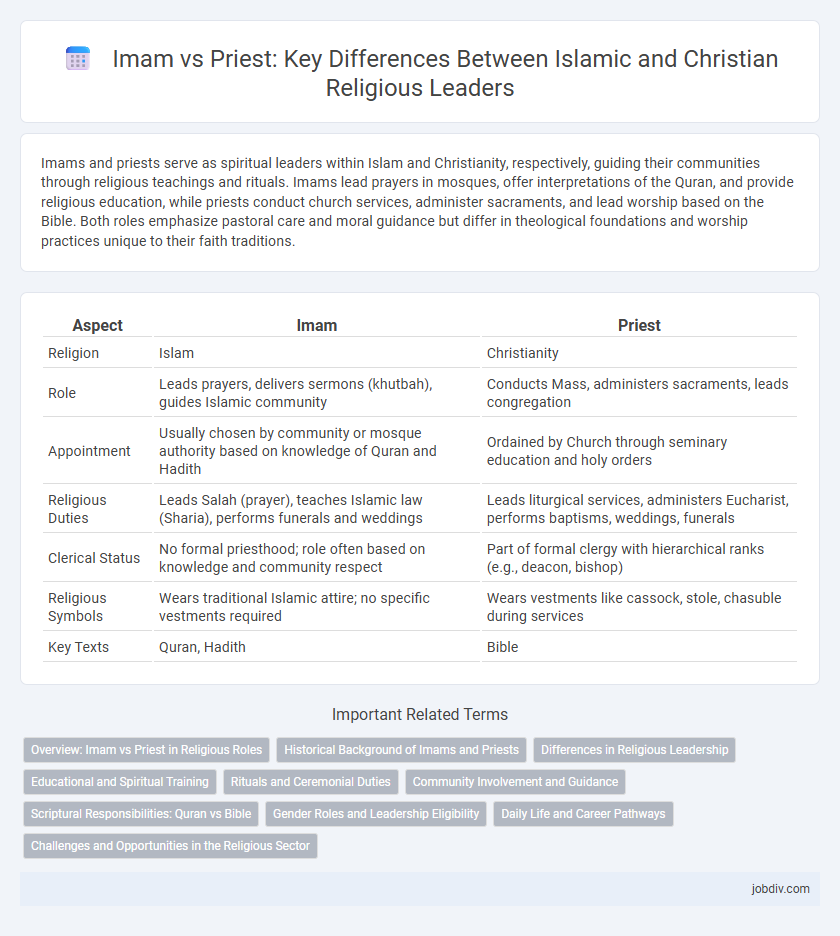Imams and priests serve as spiritual leaders within Islam and Christianity, respectively, guiding their communities through religious teachings and rituals. Imams lead prayers in mosques, offer interpretations of the Quran, and provide religious education, while priests conduct church services, administer sacraments, and lead worship based on the Bible. Both roles emphasize pastoral care and moral guidance but differ in theological foundations and worship practices unique to their faith traditions.
Table of Comparison
| Aspect | Imam | Priest |
|---|---|---|
| Religion | Islam | Christianity |
| Role | Leads prayers, delivers sermons (khutbah), guides Islamic community | Conducts Mass, administers sacraments, leads congregation |
| Appointment | Usually chosen by community or mosque authority based on knowledge of Quran and Hadith | Ordained by Church through seminary education and holy orders |
| Religious Duties | Leads Salah (prayer), teaches Islamic law (Sharia), performs funerals and weddings | Leads liturgical services, administers Eucharist, performs baptisms, weddings, funerals |
| Clerical Status | No formal priesthood; role often based on knowledge and community respect | Part of formal clergy with hierarchical ranks (e.g., deacon, bishop) |
| Religious Symbols | Wears traditional Islamic attire; no specific vestments required | Wears vestments like cassock, stole, chasuble during services |
| Key Texts | Quran, Hadith | Bible |
Overview: Imam vs Priest in Religious Roles
Imams serve as spiritual leaders in Islam, guiding prayer, teaching the Quran, and providing religious and community leadership. Priests in Christianity perform sacraments, lead worship services, and offer pastoral care and guidance within their congregations. Both roles emphasize religious authority and community support, but their practices and theological foundations differ according to Islamic and Christian traditions.
Historical Background of Imams and Priests
Imams, central to Islamic tradition, emerged as religious leaders following the Prophet Muhammad's death, serving as spiritual guides and community leaders primarily within Shia Islam, where they are considered divinely appointed. Priests, rooted in Christian and ancient religious practices, historically functioned as mediators between the divine and followers, responsible for conducting rituals, sacraments, and maintaining ecclesiastical authority. The development of imams and priests reflects distinct theological foundations and institutional evolutions shaped by the socio-religious contexts of Islam and Christianity.
Differences in Religious Leadership
Imams are Muslim religious leaders who lead prayers, interpret the Quran, and provide spiritual guidance within the Islamic community, often selected based on knowledge and piety rather than formal ordination. Priests, primarily in Christian denominations, undergo formal theological training and ordination, administering sacraments and leading congregational worship with a hierarchical clergy structure. While imams emphasize direct community engagement and scholarly teaching, priests typically operate within established ecclesiastical frameworks with defined liturgical roles.
Educational and Spiritual Training
Imams undergo extensive Islamic theological education, including Quranic memorization, Hadith studies, and jurisprudence, often through formal religious seminaries known as madrasas. Priests typically receive comprehensive training in Christian doctrine, liturgy, and pastoral care through seminary programs that emphasize philosophy, theology, and canon law. Both roles require rigorous spiritual formation and mentorship to prepare for guiding their communities in worship, moral teachings, and religious rituals.
Rituals and Ceremonial Duties
Imams lead Islamic prayers, including Salah and Jummah, and guide religious rituals such as Ramadan fasting and Eid celebrations, emphasizing recitation of the Quran and adherence to Sharia. Priests conduct Christian sacraments like Mass, Eucharist, and confession, facilitating ceremonies including weddings, baptisms, and funerals, often serving as intermediaries between the congregation and God. The distinct ritual roles highlight the theological differences: imams focus on Quranic guidance and communal worship, while priests perform sacramental rites rooted in Christian doctrine.
Community Involvement and Guidance
Imams play a crucial role in Muslim communities by leading prayers, offering spiritual guidance, and participating actively in social and educational initiatives, thereby fostering a strong sense of unity and support. Priests in Christian congregations provide religious ceremonies, pastoral care, and engage in community outreach programs that address social welfare and moral development. Both figures serve as pivotal spiritual leaders, shaping their communities' religious practices and moral perspectives through active involvement and personalized guidance.
Scriptural Responsibilities: Quran vs Bible
Imams derive their scriptural responsibilities primarily from the Quran, where they lead prayers, provide religious guidance, and interpret Islamic law based on Quranic verses and Hadith traditions. Priests base their duties on the Bible, administering sacraments, delivering sermons, and guiding their congregations through teachings found in both the Old and New Testaments. The Quran emphasizes community leadership and adherence to Sharia, while the Bible focuses on pastoral care and sacramental rites as central to clerical responsibilities.
Gender Roles and Leadership Eligibility
Imams in Islam can be both male and female, although men traditionally hold leadership roles in congregational prayers and religious guidance, while women may lead other women in prayer and religious education. In many Christian denominations, priests are predominantly male, with leadership roles generally restricted to men due to traditional interpretations of religious texts. Gender roles in both religions significantly influence leadership eligibility, reflecting broader theological and cultural frameworks within Islamic and Christian communities.
Daily Life and Career Pathways
Imams, central to Islamic worship and community guidance, often balance roles as prayer leaders, educators, and counselors, with career paths including mosque leadership, Islamic schools, and chaplaincy services. Priests in Christian traditions serve as spiritual leaders, sacramental ministers, and community organizers, frequently pursuing vocations within parishes, diocesan offices, or religious orders. Both careers require deep theological training and commitment to pastoral care, yet differ in ritual practices, religious doctrines, and institutional structures shaping daily responsibilities.
Challenges and Opportunities in the Religious Sector
Imams face the challenge of addressing diverse community needs while preserving Islamic teachings, often navigating cultural sensitivities and political pressures within mosques. Priests encounter opportunities to engage congregations through modern communication tools and social outreach programs that promote social justice and inclusivity. Both religious leaders must balance tradition with contemporary relevance to sustain faith communities and foster interfaith dialogue.
Imam vs Priest Infographic

 jobdiv.com
jobdiv.com